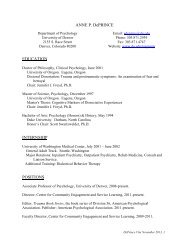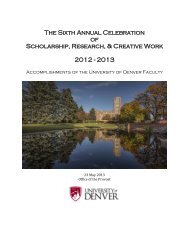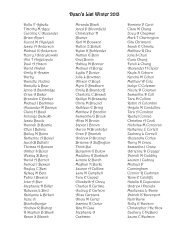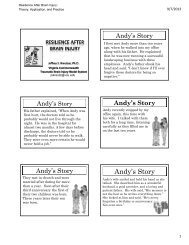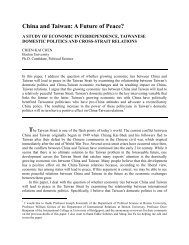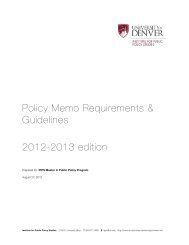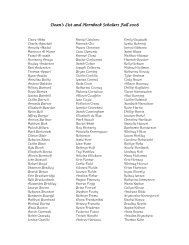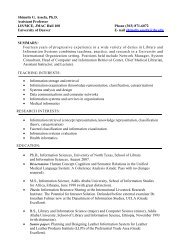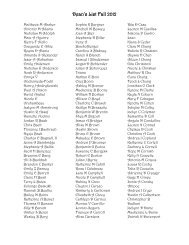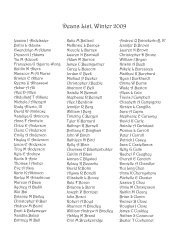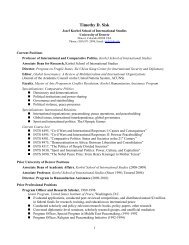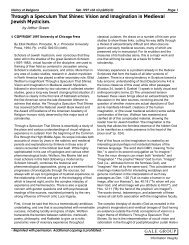The Law of the Living: On Clarice Lispector
The Law of the Living: On Clarice Lispector
The Law of the Living: On Clarice Lispector
Create successful ePaper yourself
Turn your PDF publications into a flip-book with our unique Google optimized e-Paper software.
In Agua Viva she confesses, “I don’t know what I am writing<br />
about: I am obscure to myself. This is not a message <strong>of</strong> ideas that I am<br />
transmitting to you but an instinctive ecstasy <strong>of</strong> whatever is hidden<br />
in nature and that I foretell.” In <strong>the</strong> Hour <strong>of</strong> <strong>the</strong> Star <strong>the</strong> interpolated<br />
author wonders, “Could it be by entering <strong>the</strong> seed <strong>of</strong> her life I’m violating<br />
<strong>the</strong> secret <strong>of</strong> <strong>the</strong> pharaos? Will I get <strong>the</strong> death penalty for speaking<br />
<strong>of</strong> a life that contains like all our lives an inviolable secret?” In A<br />
Breath <strong>of</strong> Life, <strong>the</strong> climactic high point <strong>of</strong> <strong>Lispector</strong>’s internal dialogues<br />
flushed into a barely visible narrative, she asks, “Does ‘writing’ exist<br />
in and <strong>of</strong> itself? No. It is merely <strong>the</strong> reflection <strong>of</strong> a thing that questions.”<br />
A thing that questions might be a potent guiding principle through<br />
<strong>Lispector</strong>’s work, which approaches <strong>the</strong> enigma without ever daring<br />
to fully capture it. <strong>Lispector</strong> weaves and tears at a symbiotic web<br />
<strong>of</strong> radical statements interrupted by even starker questions: “I lose<br />
<strong>the</strong> identity <strong>of</strong> <strong>the</strong> world inside myself and exist without guarantees.<br />
Is God a form <strong>of</strong> being? <strong>The</strong> abstraction that materializes in <strong>the</strong> nature<br />
<strong>of</strong> all that exists? My roots are in <strong>the</strong> divine shadows. Drowsy<br />
roots. Wavering in <strong>the</strong> dark shadows.” Especially her last four books<br />
<strong>The</strong> Passion According to G.H., Agua Viva, <strong>The</strong> Hour <strong>of</strong> <strong>the</strong> Star, and A<br />
Breath <strong>of</strong> Life, which were recently published by New Directions with<br />
fancy new book covers, retranslations and charming introductions by<br />
<strong>the</strong> likes <strong>of</strong> Colm Tóibín, Pedro Almodóvar and Jonathan Franzen,<br />
all pr<strong>of</strong>essing <strong>Lispector</strong>’s pr<strong>of</strong>ound influence on <strong>the</strong>ir work, are dedicated<br />
to this structure and vein <strong>of</strong> intensity.<br />
“<strong>The</strong> law <strong>of</strong> <strong>the</strong> living,” which is different from <strong>the</strong> law constructed<br />
by civilization, unmasks life outside <strong>of</strong> imitation and familiarity.<br />
In <strong>The</strong> Passion According to G.H., <strong>the</strong> book that most violently<br />
confronts “all <strong>the</strong> lies that have helped us live,” a languid middle-class<br />
woman discovers upon entering her former maid’s room <strong>the</strong> vile presence<br />
<strong>of</strong> a well known literary beast, <strong>the</strong> cockroach, already immortalized<br />
by <strong>Lispector</strong>’s literary counterpart Franz Kafka. “<strong>The</strong> roach’s face<br />
was sticking straight out, at <strong>the</strong> height <strong>of</strong> my head and my eyes. I had<br />
never seen a cockroach. I had just been repulsed by its ancient and<br />
ever present existence- but had never actually come face to face with<br />
one, not even in thought.” <strong>The</strong> death that occurs in <strong>the</strong> book is not<br />
only that <strong>of</strong> <strong>the</strong> roach (slow and agonizing), but also that <strong>of</strong> civilization<br />
and language. It is a seemingly direct transcription <strong>of</strong> mystical experience<br />
and recalls Moses’ destruction <strong>of</strong> <strong>the</strong> tablets <strong>of</strong> law, <strong>the</strong> breaking<br />
<strong>of</strong> <strong>the</strong> book in order for <strong>the</strong> book to become human. This breaking<br />
occurs in <strong>the</strong> moment G.H. faces <strong>the</strong> cockroach, which to her horror<br />
is not repulsive, as she was told and believed, but “primally alive.”<br />
95



